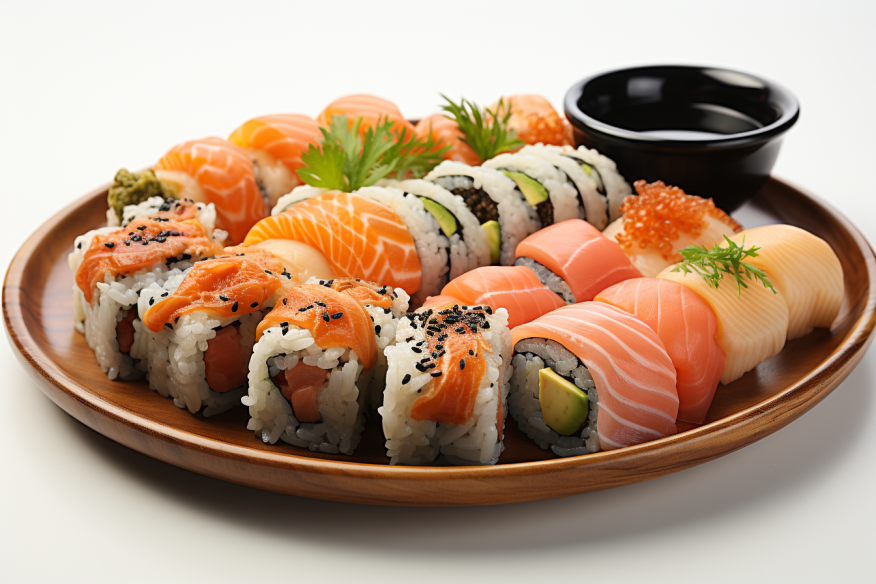
Sushi has gained immense popularity in recent years, becoming a favorite choice for food enthusiasts worldwide. However, many individuals wonder if sushi is truly a healthy option. In this article, we will delve into the question, „Is sushi healthy?“ and explore its origins while shedding light on the health benefits it offers. Read on to discover why sushi can be a nutritious and delicious addition to your diet.
Origin of Sushi:
Sushi has a rich history that can be traced back to ancient Japan. Originally, sushi was created as a preservation method for fish. The fish was wrapped in fermented rice to extend its shelf life, allowing people to enjoy it over a longer period. Over time, sushi evolved, and various styles and preparations emerged, including nigiri, maki, sashimi, and more.

Is Sushi Healthy?
When it comes to the healthiness of sushi, the answer depends on several factors. Traditional sushi, made with fresh fish, seaweed, rice, and vegetables, can be a nutritious choice. Here are some key reasons why sushi can be a healthy option:
- Nutrient-rich Fish: Sushi often features fish like salmon, tuna, or mackerel, which are excellent sources of omega-3 fatty acids, protein, and essential vitamins and minerals. Omega-3 fatty acids are known for their heart-healthy benefits, reducing the risk of cardiovascular diseases.
- Seaweed Benefits: Nori, the seaweed used in sushi rolls, is packed with nutrients such as iodine, iron, and calcium. It is also a good source of fiber and antioxidants, supporting thyroid function and promoting overall well-being.
- Low in Saturated Fat: Compared to other fast food or fried options, sushi generally contains low levels of saturated fat. This makes it a healthier alternative for those watching their fat intake.
- Portion Control: Sushi is typically served in bite-sized pieces, allowing for portion control. This can be beneficial for maintaining a balanced diet and managing calorie intake.
- Vegetable Inclusions: Sushi often incorporates fresh vegetables like cucumber, avocado, and carrots, adding essential vitamins, minerals, and dietary fiber to the meal.
While sushi can be a healthy choice overall, there are certain components and preparations that may not align with a nutritious diet. Here are some elements to be mindful of when considering the healthiness of sushi:
- Excessive Rice: Sushi rolls often contain a significant amount of rice. While rice itself is not inherently unhealthy, consuming excessive amounts can contribute to a high carbohydrate intake, which may not be suitable for individuals following low-carb or low-glycemic diets.
- Fried Tempura: Some sushi rolls incorporate tempura-fried ingredients, such as shrimp or vegetables. The deep-frying process adds extra calories, unhealthy fats, and sodium, diminishing the overall nutritional value of the sushi.
- Sugary Sauces: Certain sushi rolls may be accompanied by sauces that are high in sugar and sodium, such as teriyaki sauce, eel sauce, or spicy mayo. These condiments can significantly increase the calorie and sodium content of the sushi, affecting its overall healthiness.
- Artificial Ingredients: Some sushi establishments may use artificial food colorings, flavorings, or preservatives in their ingredients or condiments. These additives may not offer any nutritional value and can be detrimental to health when consumed in excess.
- Mercury Content: Certain fish commonly used in sushi, such as tuna, may contain higher levels of mercury. While occasional consumption is generally safe for most individuals, pregnant women and young children should be cautious about their mercury intake and consider opting for lower-mercury fish options.
It’s important to note that the inclusion of these components does not automatically render sushi unhealthy. However, for those aiming for a particularly nutritious sushi experience, it is advisable to choose options that prioritize fresh, high-quality ingredients, lean proteins, and minimal processing.
Conclusion:
In conclusion, sushi can be a healthy choice when consumed mindfully and prepared with quality ingredients. Its origins as a preservation method have evolved into a culinary delight that offers various health benefits. From the nutrient-rich fish to the inclusion of seaweed and vegetables, sushi provides a well-rounded and flavorful dining experience.
However, it’s important to note that not all sushi options are equally healthy. Care should be taken to avoid high-calorie additions such as mayonnaise-based sauces, tempura-fried rolls, and excessive amounts of soy sauce. Moderation and choosing fresh, high-quality ingredients are key.
Next time you ponder, „Is sushi healthy?“ remember that when enjoyed as part of a balanced diet, sushi can be a nutritious and delicious option that satisfies your taste buds while nourishing your body. Embrace the flavors and traditions of sushi while reaping the health benefits it has to offer.


